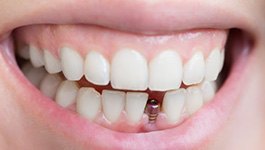Dental Implants Wakefield
Your One-Stop Shop for Permanent Tooth Replacement

Are you missing one tooth, several teeth, or all your teeth? No matter the extent of your tooth loss, you can a achieve beautiful, natural-looking, and strong smile with dental implants in Wakefield. This revolutionary restorative service mimics every structure of a missing tooth from root to crown. As a result, they provide patients with a new set of pearly whites that is virtually indistinguishable from the real thing. At Schumacher Dental, we’re proud to be your one-stop shop for permanent tooth replacement! Get in touch with our board-certified prosthodontist Dr. Schumacher to learn more about rebuilding your smile with dental implants in Wakefield.
Why Choose Schumacher Dental for Dental Implants?
- Board-Certified Prosthodontist with Extensive Training in Implant Dentistry
- Permanently Replace Any Number of Missing Teeth
- State-of-the-Art Practice with Advanced Dental Technology for Precise Treatment
What Are Dental Implants?

A single dental implant is a small cylinder, typically made of titanium, that gets placed beneath the gumline and into the jawbone in a minimally invasive surgery. During the recovery period that follows, something amazing happens; the bone actually fuses to the dental implant. This allows the dental implant to act as an incredibly strong replacement for the root of a missing tooth. While other tooth replacement options only replace the visible portion of missing teeth, rebuilding a missing tooth from the roots up provides unmatched stability, comfort, function, and aesthetics. One or more dental implants can be placed to support restorations for any number of missing teeth. Your custom-made crown, bridge, or denture will be carefully crafted out of durable and lifelike materials to ensure your new smile is as good as new!
The 4-Step Dental Implant Process

Many general dentists offering implant dentistry send patients to a specialist for the placement of dental implants since it’s a minor surgical procedure. As a board-certified prosthodontist with advanced training and expertise, Dr. Schumacher offers top-of-the-line implant dentistry at his Wakefield dental office so you can save time and money while continuing to work with a dental team you already know and trust. Getting dental implants requires a multi-step process. Here are the four main steps you can expect.
Initial Dental Implant Consultation

The first step when getting dental implants is your consultation. During this time, we will go over your dental health and medical history to see if you make a good candidate. We can work with you to complete preliminary procedures, like gum disease therapy, tooth extractions, and bone grafting if needed. Then, we can move on to planning the rest of your dental implant treatment. We will go over the step-by-step process in detail and discuss the financial aspects of your treatment so that you know what to expect.
Dental Implant Surgery

We complete the entire dental implant treatment process at our practice. First, the area is numbed with a local anesthetic. Then, an incision is made into the gum tissue so the implants can carefully be placed into the jawbone. The gum tissue is closed, and healing caps are placed over the implants for a smooth recovery.
Dental Osseointegration & Abutment

Following surgery, your mouth needs time to heal. As it does, the jawbone and implant(s) form a natural bond in a process known as “osseointegration.” This bond between your implant(s) and jaw is what enables implant patients to enjoy such natural results. Your final restoration will be made based on impressions taken of your mouth.
Delivery of Dental Implant Restorations

Once the osseointegration process is complete, you’ll return to our Wakefield dental office to have your custom-made prosthetic attached. This phase of care is known as the restoration phase. Once it’s complete, you can look forward to enjoying a beautiful new smile for years to come.
Benefits of Dental Implants

With so many tooth-replacement options to choose from, you might be wondering why 500,000 patients choose dental implants each year. The short answer is: they are worth it! In this next section, we’re covering the day-to-day benefits, health benefits, and long-term benefits of rebuilding your smile with dental implants.
Day-to-Day Benefits

Are you currently struggling to smile confidently? Is your diet limited or is your oral hygiene regimen incredibly cumbersome? Good news: patients with dental implants enjoy easier maintenance, increased confidence, and the ability to eat most foods. Here’s how:
- Easier Maintenance: You won’t have to worry about drastically changing your oral hygiene regimen or stocking up on a bunch of special dental care products. To keep your dental implants in pristine condition, take care of them like your natural teeth!
- Increased Confidence: Simply put, no other tooth replacement option provides the same level of aesthetics as dental implants. That’s because they function naturally and the size, shape, and shade of the restoration is custom-made just for you.
- Ability to Eat Most Foods: While tooth loss restricts your diet, dental implants expand it! Since the post is inserted directly into your jawbone, it’s incredibly durable. Since it’s incredibly durable, patients can enjoy a wide variety of foods with ease.
Health Benefits

Dental implants don’t just make your day-to-day life better; they benefit your oral and overall health too! Here are a few examples:
- Jawbone Preservation: While other tooth-replacement solutions get their support from their gums or surrounding teeth, dental implants get their support from their jawbone. Each time you chew, you stimulate it, helping prevent bone loss in the process.
- Protection for Natural Teeth: Because a titanium post is anchoring your tooth, there’s no need to cut down existing tooth structure just so it can hold a restoration. In other words, dental implants fill the gap or gaps in your smile without altering any of your natural, healthy teeth in the process!
- Better Overall Health: Tooth loss doesn’t just take a toll on your self-esteem, it takes a toll on your overall health. Fortunately, dental implants can fill the gaps in your smile while also preserving your jawbone, allowing you to enjoy a varied diet, and helping prevent indigestion.
Long-Term Benefits

Compared to other tooth-replacement options, dental implants require a higher upfront investment. Don’t worry – there are several long-term benefits that make them well worth it, including:
- High Success Rate: Dental implants are widely known for their durability, longevity, and reliability. According to clinical studies, dental implants have been proven to carry an average success rate as high as 98 percent over a 10-year period.
- Youthful Appearance: By reestablishing blood flow, your face and your cheeks will not prematurely sag or appear hollow, which is a common side effect of tooth loss.
- Long-Lasting Results: As long as you practice regular oral care and discontinue the use of all tobacco products, there are very few reasons why your implants would not last anywhere from 25 years to a lifetime.
Who Dental Implants Can Help

Now, all cases of tooth loss can be treated with dental implants if you are a candidate for the procedure. Depending on how many teeth you are missing, Dr. Schumacher will review all your tooth replacement options and help you pick the one that’s right for you. While the decision is ultimately up to you, our team will partner with you every step of the way to ensure you’ve chosen the best treatment option for your oral health needs and goals.
Who Is a Good Candidate for Dental Implants?

Any patient considering dental implants should schedule a consultation with Dr. Schumacher to learn more about the treatment process. Not every patient is a good candidate for implants, and an oral exam helps us understand if this service is the right solution for you. If it is, our Wakefield dental team will begin creating a custom treatment plan right away. If it’s not, we will explore alternative solutions with you during that same appointment. Oftentimes, a preliminary treatment like bone grafting or gum disease therapy can help an initially ineligible patient become a good candidate for dental implants. Regardless of the service we recommend, Dr. Schumacher uses his expertise as a prosthodontist to help you achieve functional and beautiful results. He’ll design your treatment around how many teeth you’re missing:
Missing 1 Tooth

When a single tooth is missing, a biocompatible implant post is surgically placed into your jawbone. An abutment is attached to the post to connect a custom-made dental crown.
Missing Multiple Teeth

Replacing multiple teeth with dental implants is quite similar to traditional bridges. However, instead of shaving down two teeth so they can hold a bridge, two implants hold a restoration of three to four teeth at a time. The beauty of replacing teeth in this way is that you don’t necessarily need the same number of implants to replace the same number of teeth.
If the missing teeth are spread out throughout your arch, we can place a strategically determined number of implants to secure a partial denture in place like a puzzle piece.
Missing All Teeth

If traditional dentures have failed to give you the results you want, you can benefit from the security of dental implants. To replace an entire arch of missing teeth, we can place anywhere from four to eight dental implants to secure a complete, customized denture. You will not have to worry about any slipping as you do about your day or irritation in your gum tissue or jaws. Implant dentures offer a wide array of important advantages over their traditional counterparts, and we’ll be happy to explain them to you fully during your consultation.
Oftentimes, if you are interested in getting dental implants after missing many teeth for a long time, a bone grafting procedure is needed beforehand to ensure you can support your new smile. However, for patients who aren’t able or unwell to undergo a bone graft, mini-implants may be able to help! These smaller dental implants require less jawbone density while still providing reliable support for a full denture. We can discuss your candidacy for mini-implants during your consultation.
Understanding the Cost of Dental Implants

The dental implant process is completely customized to your unique needs, which is why there’s not a single price tag on the procedure. The total cost of your dental implants in Wakefield will vary depending on several different factors, such as the number of implants being placed, the type of restoration you need, and any preparatory treatments necessary to make dental implants possible. Keep in mind that dental implants are a long-term solution for tooth loss, unlike all other replacement options. The upfront cost may be higher than that of dentures or dental bridges, but it’s still cheaper in the long-term compared to regularly replacing these alternatives every several years.
A Priceless Investment

With so many unique benefits to offer, it’s no surprise why patients and professionals agree that they’re a life-changing and worthwhile investment. Not only do they last up to four times as long as traditional restorations, but they also provide you with added stability and strength, meaning fewer daily complications. That means that you’ll be able to safe many in the long-run by not having to replace or repair them as often.
Does My Dental Insurance Cover Dental Implants?

Unfortunately, dental insurance typically doesn’t cover the cost of dental implants because it’s still considered a “cosmetic” procedure. Because of this, many patients decide to pay for the procedure with cash, check, or credit card. Our team is dedicated to helping you maximize your benefits and savings, so we’ll be more than happy to file any claims on your behalf in case your insurance will cover a portion of the cost.
Dental Implant Failure & Salvage

Even a decade following their placement, dental implants have an impressive success rate of about 95%! Of course, there’s still a chance of dental implant failure. If your newly rebuilt smile ever feels loose or uncomfortable, let us know right away. Our team can restore your smile with effective dental implant salvage treatment.
Learn More About Dental Implant Failure and Salvage
Dental Implant Post-Op Instructions

Once your new dental implants are surgically placed, the healing process can begin. Taking things slowly and following these important steps is vital to a successful surgical outcome. Keep reading to learn what you can expect from recovery, such as which symptoms are normal. Should you experience any abnormal pain or other strange side-effects you do not see mentioned here, please don’t hesitate to call Dr. Schumacher for guidance.
What to Do Directly After Dental Implant Surgery

Immediately following your procedure, your biggest priority is to leave the forming blood clots untouched so that your implants can heal smoothly. To do this, be sure to abide by these important guidelines:
- Don’t spit; use tissues or swallow your saliva
- Do not use drinking straws
- Do not touch the surgical site with your fingers or tongue
- Do not smoke for at least 24 hours
Common Side-Effects When Recovering from Dental Implant Placement

It is completely normal to experience some mild side-effects following your dental implant placement procedure, especially in the initial few days post-op. Common side-effects may include:
- General discomfort. This can be treated with over the counter or prescription pain medication.
- Intermittent bleeding. This can be reduced by gently biting down on rolled gauze with light pressure.
- This may last more than 72 hours and could take up to a week. Applying warm or cold compresses can help.
These symptoms are temporary and should gradually subside within the first few weeks. Should yours last longer than normal, please reach out to Dr. Schumacher for further instructions.
Your Diet After Dental Implant Surgery

In the initial days following your dental implant surgery, Dr. Schumacher recommends that you stick to a diet consisting of soft foods, including:
- Soup (warm or room temperature only)
- Mashed potatoes
- Scrambled eggs
- Pasta
- Ice cream
- Pudding
You may resume your regular diet as soon as you feel ready, however we recommend that you limit tough or crunchy foods for the first few weeks and avoid direct chewing on the implant site(s).
Post-Op Health & Oral Hygiene

Caring for your teeth and gums is important during recovery, however we recommend waiting 24 hours post-operative before brushing your teeth. Then, you may brush as usual but be very careful around the surgical site(s).
Rinse your mouth with warm salt water after every meal and use prescription mouth rinse if necessary. Be sure to avoid any over the counter mouthwashes that contain high levels of alcohol such as Listerine or Scope.
What to Do After Your New Teeth Are Attached
Congratulations! You made it! Now it’s time to get your crown, bridge or denture placed. Once your prosthetic is attached, you may experience some minor, temporary sensitivity in the gum tissue, however this is easily managed with pain medication. There should not be any swelling, bleeding, or lengthy recovery for this step. In fact, your smile will be ready to show off the very same day!
Maintaining & Caring for Your Dental Implants

Because they are surgically placed in the jawbone and naturally fused with their surrounding tissue through the natural process of osseointegration, dental implants can potentially stay healthy, functional, and strong for a lifetime. However, they may fail and need replacement if you don’t take the proper measures to protect them from damage and infection. Here are a few simple ways to keep your new smile in excellent shape for decades to come.
Make Oral Hygiene a Priority

While dental implants are immune to tooth decay, they still require excellent oral hygiene to keep the gums and jawbone tissue supporting them healthy. Remember to brush and floss daily and use antibacterial mouthwash regularly to prevent infections like gum disease that can compromise your implants.
Eat a Healthy Diet

Dental implants allow you to exert the robust chewing power necessary to handle food of any toughness and texture. However, consuming too many foods and beverages that are high in sugar and acid or excessively hard can promote infections and damage your artificial teeth. Be sure to eat a healthy diet that includes plenty of calcium and vitamin C to keep your gums and jawbones strong.
Break Bad Habits

Indulging in bad habits can set your dental implants up for early failure. Avoid excessive alcohol consumption as well as tobacco use in any form, as these habits can prevent your gums from healing properly and make infection more likely. It’s also important to refrain from using your teeth to open packages or bottles, as this can damage your implant as well as your natural teeth.
Protect Your Dental Implants

While dental implants are incredibly durable, they are not indestructible. Always wear an athletic mouthguard when engaging in sports or other intense physical activities to protect your teeth and implants from injury. If you grind your teeth at night, wear a nightguard to reduce wear and tear on your smile.
Schedule Regular Dental Checkups

Even if all your teeth have been replaced with dental implants, seeing your dentist regularly is still crucial to preserving your oral health. Visit us at our Wakefield office every six months so we can monitor your oral health and the state of your dental implant. We’ll advise you as to better ways to take care of your smile at home and correct any issues we find in their early stages so your implant can stay healthy and strong for life.
Dental Implant FAQs

Would you like to learn more about dental implants in Wakefield before you commit to an initial consultation? For your convenience, we’ve answered some of the most common questions that we receive from our patients below.
Does Dental Implant Surgery Hurt?
At first, the thought of dental implant procedure may seem daunting. However, we want to ensure you that you have nothing to fear. Getting dental implants is actually quite a comfortable procedure! Before your implants are placed, you will be administered a local anesthetic or sedation to ensure that you are comfortable and your treatment is pain-free. Depending on the number of implants you need to have placed, your surgery could take as little as 30 minutes or as long as a few hours. When you visit us for your initial consultation, we’ll discuss all of the details with you based on our examination of your mouth.
Do I Still Need Regular Dental Checkups If I Have Dental Implants?
Even though your artificial teeth can’t get cavities, it’s still vital to visit our office every six months for an examination and a cleaning. If you let harmful oral bacteria accumulate in your mouth, it can cause your gums to be infected, eventually resulting in implant failure if left unchecked. During your semi-annual visits, we’ll make sure that any lingering issues get treated before they can cause permanent damage to your implants.
What Can Cause Dental Implant Failure?
There are several bad oral habits and factors that can impact the success of your implants. Some of them include:
- Tobacco use
- Insufficient jawbone density
- Medical conditions that impact your immune system
- Poor dental hygiene
If you’re concerned about the success of your implants, don’t hesitate to ask us any questions you have during your consultation. We’ll walk you through the procedure and discuss whether you’re a good candidate for this restorative solution. If you aren’t we also offer traditional tooth replacement options such as dentures and bridges as well.
